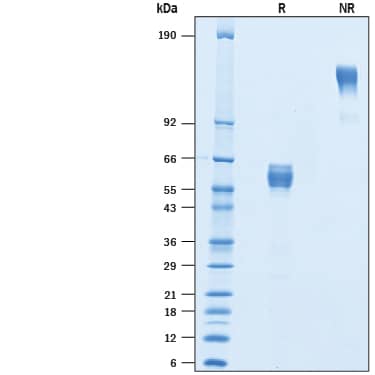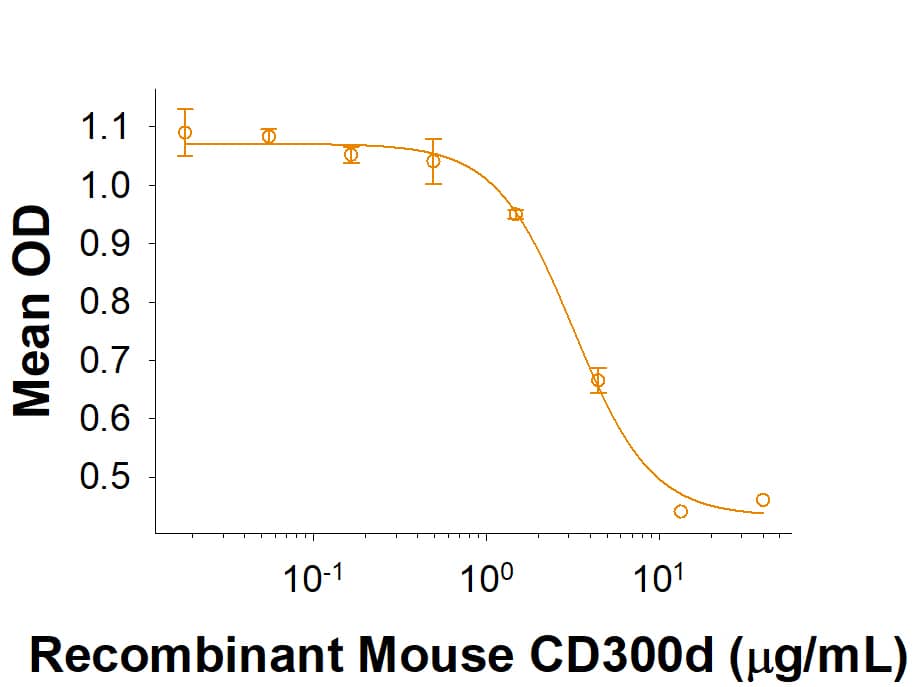Recombinant Mouse CD300d Fc Chimera Protein, CF
R&D Systems, part of Bio-Techne | Catalog # 10310-LM

Key Product Details
Source
NS0
Accession #
Structure / Form
Disulfide-linked homodimer
Conjugate
Unconjugated
Applications
Bioactivity
Product Specifications
Source
Mouse myeloma cell line, NS0-derived mouse CD300d protein
| Mouse CD300d (Asn20-Leu172) Accession # BAF46249.1 |
IEGRMDP | Mouse IgG2a (Glu98-Lys330) |
| N-terminus | C-terminus |
Purity
>95%, by SDS-PAGE visualized with Silver Staining and quantitative densitometry by Coomassie® Blue Staining.
Endotoxin Level
<1.0 EU per 1 μg of the protein by the LAL method.
Predicted Molecular Mass
44 kDa
SDS-PAGE
48-66 kDa, under reducing conditions
Activity
Measured by its ability to inhibit anti-CD3 antibody induced IL-2 or IFN-gamma secretion by human T cells.
The ED50 for this effect is 1-10 μg/mL.
The ED50 for this effect is 1-10 μg/mL.
Scientific Data Images for Recombinant Mouse CD300d Fc Chimera Protein, CF
Recombinant Mouse CD300d Fc Chimera Protein Bioactivity
Recombinant Mouse CD300d Fc Chimera (Catalog # 10310-LM) inhibits anti-CD3 antibody induced IL-2 secretion by human T cells. The ED50 for this effect is 1‑10 μg/mL.Recombinant Mouse CD300d Fc Chimera Protein SDS-PAGE
2 μg/lane of Recombinant Mouse CD300d Fc Chimera (Catalog # 10310-LM) was resolved with SDS-PAGE under reducing (R) and non-reducing (NR) conditions and visualized by Coomassie® Blue staining, showing bands at 48-66 kDa and 100-130 kDa, respectively.Formulation, Preparation and Storage
10310-LM
| Formulation | Lyophilized from a 0.2 μm filtered solution in PBS. |
| Reconstitution | Reconstitute at 200 μg/mL in PBS. |
| Shipping | The product is shipped at ambient temperature. Upon receipt, store it immediately at the temperature recommended below. |
| Stability & Storage | Use a manual defrost freezer and avoid repeated freeze-thaw cycles.
|
Background: CD300d
References
- Comas-Casellas, E. et al. 2011. J. Biol. Chem. 287:9682.
- Clark, G.J. et al. (2009) Trends in Immunology 30:209.
- Borrego F. (2013) Blood 121:1951.
- Haga, K. et al. 2016. PNAS. 113:E6248.
- Orchard, R. et al. 2016. Science. 353:933.
- Graziano, V et al. 2019. Viruses. 11:pii.
Long Name
CD300 Molecule-Like Family Member D
Alternate Names
CD300d, CD300LD, CLM-5, MAIR-IV
Gene Symbol
CD300LD
UniProt
Additional CD300d Products
Product Documents for Recombinant Mouse CD300d Fc Chimera Protein, CF
Product Specific Notices for Recombinant Mouse CD300d Fc Chimera Protein, CF
For research use only
